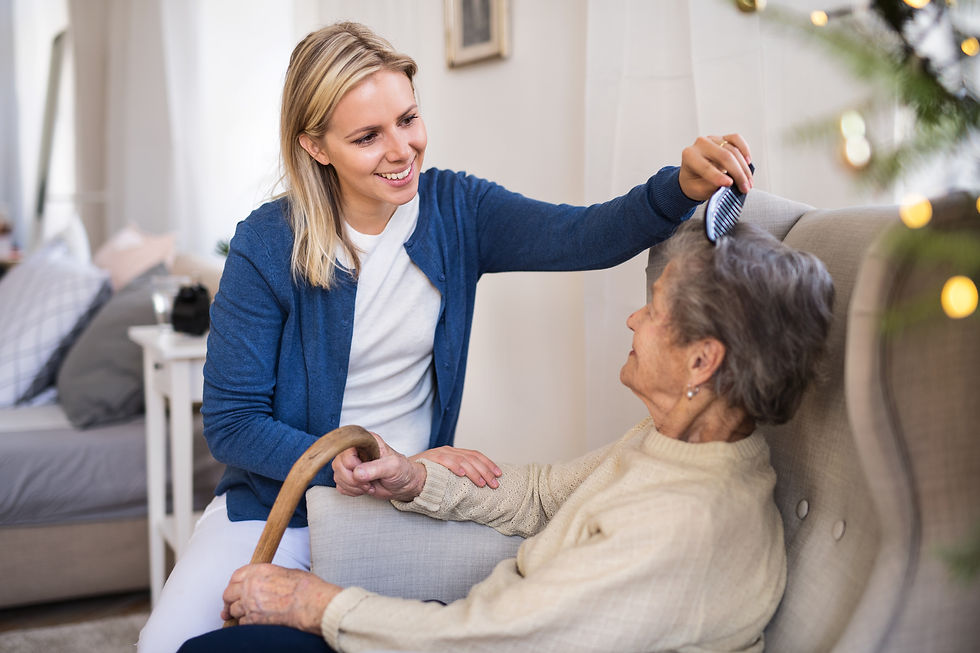Self-Care for Carers: Putting Your Wellbeing First
- Mia Dalessandro

- Sep 23, 2025
- 4 min read

Our heroes without capes, carers give so much of themselves to others—whether it’s supporting a partner through chronic illness, guiding a child with a disability, or helping ageing parents stay safe and connected. Carers often juggle multiple roles—nurse, advocate, organiser, emotional anchor—while quietly putting their own needs to the side.
But when the focus is always on someone else’s wellbeing, it’s easy to lose sight of your own health, rest, and sense of self. Over time, this can lead to exhaustion, burnout, or feeling invisible.
That’s why National Carers Week (12–18 October) is such an important reminder. It’s more than just a week of recognition—it’s a collective moment to pause and honour the extraordinary 3 million Australians who provide unpaid care every day. It’s also a chance to spark meaningful conversations about how we can better support carers, raise community awareness, and share practical strategies to help them protect their own wellbeing while continuing the invaluable work they do.
As the Canberra Times highlighted, carers often face financial strain, emotional fatigue, and a lack of recognition, despite the essential role they play in holding families and communities together. The Star Weekly also emphasised that awareness weeks like this one are not only about recognition, but also about encouraging carers to take the time to look after themselves.
Why carers need self-care
Caring for someone you love can be deeply meaningful. Many carers describe the experience as rewarding, giving them a strong sense of purpose and connection. Yet at the same time, it can be one of the most demanding roles a person will ever take on. From managing medical appointments and daily routines to providing emotional support and advocating for services, the responsibilities can feel endless.
Research shows that carers consistently report higher levels of stress, fatigue, and burnout compared to the general population. Many experience anxiety or depression, often linked to the constant pressure of putting another person’s needs ahead of their own. Add to this the isolation some carers feel—especially if they’ve had to step back from work or social activities—and it’s clear why self-care becomes not just important, but essential.
Self-care isn’t indulgent—it’s a form of maintenance. Just like a car can’t run on an empty tank, you can’t continue to provide the best care for someone else if you’re running on empty yourself. Neglecting your own needs can lead to sleep problems, weakened immunity, irritability, and eventually burnout. And when your health suffers, your capacity to care is reduced too.
Making space for your own wellbeing—whether through regular breaks, professional support, or simply carving out moments of rest—means you can recharge your energy, protect your mental health, and sustain your caring role over the long term.
Carving out time for yourself
Micro-moments matter: Take five minutes for a walk, deep breathing, or mindfulness.
Book in “you time”: Block out non-negotiable windows in your week to recharge.
Try hypnosis or guided relaxation: Short hypnosis sessions can reduce stress, improve sleep, and help reset your nervous system.

Setting boundaries with support
Saying no is often one of the hardest things for carers to do. Many feel an immense sense of responsibility, carrying the belief that they must always be available, that no one else can provide the same level of care, or that stepping back would make them “selfish.” These thoughts can create guilt and make it almost impossible to draw the line, even when exhaustion sets in.
This is where strategic psychotherapy can make a real difference. Unlike traditional talk therapy, strategic psychotherapy focuses on uncovering and reshaping unhelpful patterns of thinking. For carers, this might mean reframing beliefs such as “I have to do it all myself” or “Resting means I’m letting someone down.” By recognising these thought patterns, carers can learn new, more empowering ways of responding—setting boundaries without guilt, asking for help sooner, and recognising that their wellbeing is just as important as the person they’re caring for.
Protecting your energy doesn’t mean you’re neglecting your loved one—it means you’re investing in your ability to continue caring over the long term. Boundaries create breathing space: space to rest, recharge, and reconnect with yourself. With that renewed energy, you’ll find you have more patience, compassion, and resilience to bring back into your caring role.
Practical self-care tips for carers
Stay socially connected—talk to people who understand your journey.
Nourish your body with rest, good food, and hydration.
Seek professional support—to strengthen resilience and ease anxiety.
Ask for help—through respite, family, or services—before you reach breaking point.
Support organisations in Australia
Carer Gateway – National hub for free carer services: carergateway.gov.au
Carers Australia – Advocacy and resources: carersaustralia.com.au
Lifeline – 24/7 crisis support: 13 11 14
Beyond Blue – Mental health support: 1300 22 4636
This National Carers Week, let’s remember the selfless carers who keep households, families, and communities strong. If you’re a carer, honour your own wellbeing too. Through small daily practices, community resources, and professional support you can recharge, restore balance, and continue giving from a place of strength and compassion.
Awareness is only the first step. Recognition must be matched with action—support, resources, and community understanding—so that carers don’t just survive, but thrive.
And to coincide with Carers Week, my monthly webinar on October 15 focuses on handy hints and support for our heroes. Book a seat today.




Comments